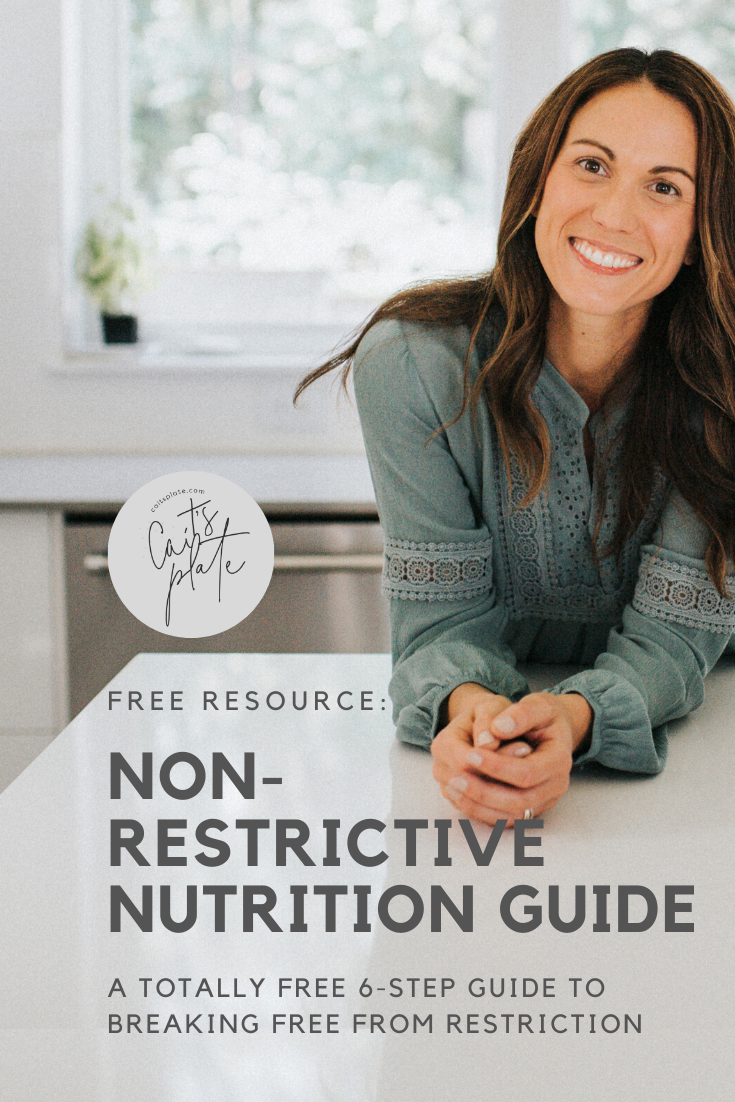
If you’re like most people who have been been swayed by the numerous messages we’re exposed to every day telling you to control what you eat and lose weight for better health, it’s not uncommon that you might have a food (or a few foods) that you just feel out of control with.
You might even be interested in Intuitive Eating and making peace with food but hesitate to embrace the “unconditional permission to eat all foods” for fear that if you allow particular food (or foods) into your life, you will never stop eating it.
If you feel this way, know that you are not alone. Years of being steeped in our society’s diet culture, disconnected from your internal signals, being told what to eat when and being made to feel you did something wrong when you deviated from the plan can absolutely make you feel out of control with food. I can remember so well feeling the exact same way as I desperately tried to cling to the unrealistic guidelines that were promoting “health.” And the harder I tried to “get healthy” (by controlling what I ate, increasing exercise and losing weight), the less in control I really felt.
Here’s the thing: you will have a really hard time making peace with food (which involves exposure to those foods you think you can’t control yourself around) if you are not fed (and if you are associating guilt with that food…but we’ll get to that).
So for instance, say you (whether intentionally or unintentionally) have a day where you don’t get enough to eat, that’s not going to be a good day to attempt to make peace with a food that you’ve long restricted. When you’re undernourished, your body’s biological signals kick into overdrive and you develop a primal urge to eat. This is because our bodies cannot differentiate dieting or self-imposed restriction/control from a true famine. All they can tell is that fuel is not coming in consistently and they need that in order to continue running things. It’s like trying to drive a car with no gas or charge. When your gas or charge on your car are low, your car is going to let you know it – beeps, bells, whistles, lights until eventually, it just stops running.
When you try to make peace with food while being under-fueled, you’re likely to experience eating in abundance (potentially to the point of sickness, which in turn will make you feel awful). When your body doesn’t get the consistent fuel it needs, it wants to get as much as it possibly can when it finally is exposed to it, to ensure it’s set up for the next scarcity. This experience of eating a lot further reinforces the false message that you need to tightly control your intake because you can’t be trusted around that food. But you need to know that this experience is not due to lack of control or willpower, it’s simple biology. We operate on the fuel food provides us. Our bodies are biologically set up to seek it out (and those seeking signals get stronger, the more we restrict/control our intake).
If/when you feel ready to take the stop of making peace with food, here are some recommendations:
- Make Sure You’re Well Fed. You want to be sure you’re getting enough to eat, regularly. Your body needs to be in a stable, fed state before you’re able to accomplish this. If trying this for the first time, it’s recommended to do it after eating a meal that left you feeling happily satisfied.
- Remove the Morality From Food. if you approach the exercise of making peace with food filled with feelings of guilt or shame for eating that food, connecting to what your mind and body are feeling, tasting, sensing, etc. when you eat it becomes very hard. Remember that foods are not inherently “good” or “bad.” They are all made up of units of energy that help our bodies to function. Removing the morality is incredibly important because it allows you to actually pay attention to how the food is making you feel. Maybe throughout the exercise you’ll notice “Wow, I don’t even like the taste of this now that I am able to pay attention to the experience. Not only that, but eating it didn’t make me feel very good!” Or you might notice that when you were really allowed to savor the taste, you loved it and it made you feel great, so it’s something you’ll want to include more regularly. You won’t be able to have these learning experiences if you are too busy feeling guilt over eating the food.
- Make Sure You Can Pay Attention. Make sure when you’re introducing your chosen off-limit food, you can do it at a time when you’re able to devote 100% of your attention to the process. It’s important that your mind is fully engaged with the process so that you’re able to note what comes up before, during and after it (these emotions can provide invaluable learning about your relationship to that food).
- Go Slow. Go through the process slowly. If it’s in a package, open it, take note of every aspect of opening it (what you feel as you hear the sound of the packaging rip open, how it smells, etc.). Then take a bite and hold it there for a minute, without chewing. Begin to chew it slowly while noticing the taste, texture, how it feels as you chew, etc. Take another bite and repeat the same process, stopping whenever you feel finished. Once you’ve finished your last bite, take note of the remnant taste left in your mouth. Throughout the process, check in regularly. Ask yourself: “Am I enjoying the taste? Do I like how this is making me feel?” and know that you can stop at any point throughout the activity.
- Have Patience. This experience will be different for everyone, depending on where you are in your relationship with food. It may take many repeated experiences with the same food before you reach a point of feeling peace with it. Go at your own pace. Remember that the journey of Intuitive Eating is one of learning and self-discovery. It is not pass/fail. With every experience you gain valuable insight about your relationship to food and that insight is what helps aid the healing process.
As you go through this process, you’ll likely find you experience things you never have (or haven’t in some time) with that food. Often when we’re eating in abundance, it’s done with a sense of urgency. Driven by feelings of guilt or fear, many describe the feeling as almost out of body. You’re not fully connected to the experience and you’re certainly not working to savor each bite. When I would have instances like this, I know I didn’t feel connected to my mind or body at all.
I remember the first time I ate a handful of trail mix and that alone satisfied me. I used to devour the majority of the bag every time I ate it and would end up feeling completely sick, guilty and ashamed. Once I was able to make peace with it however, I was able to eat the amount that made sense for my body which made me feel satisfied and energized rather than sick! And I didn’t have to go through this process with every off-limit food. Once I worked through it with a few of them, I was able to do it with everything! But again, go at your own pace. If you feel better experimenting in this way with each of your forbidden foods, go for it! Remember that there is no right and wrong to Intuitive Eating.
Intuitive Eating is an incredibly personal journey of learning and self-discovery. It’s a journey that no one who has gone through it before can prepare you for or tell you what it will be like because every individual is at a different place in their relationship with food. Approach each experience in your Intuitive Eating with curiosity rather than judgement. Recognize that each experience you have teaches you something more about yourself and these learning lessons are what build the road to ultimately having a peaceful relationship with food.
You Might Also Like:
Intuitive Eating: Making Peace with Food

Non-Restrictive Nutrition Guide

Leave a Reply